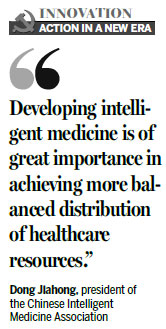Merger of IT, medical care to be fostered

National association sees great potential for improved services
A national association was set up on Saturday to promote the integration of artificial intelligence technology with medical care to improve services.
The Chinese Intelligent Medicine Association will provide a platform for research, exchange and cooperation in intelligent medicine, Zhang Yanling, president of Chinese Medical Doctor Association, which supervises the new association, said at its inauguration ceremony on Saturday.

While promoting the use of AI in medicine, the association will also assist the government in formulating standards and regulations for the development of intelligent medicine, which is still at its infancy, he said.
Intelligent medicine will profoundly transform the medical care sector, and may bring great benefits to both patients and doctors, Zhang said, adding that 124 hospitals have practiced intelligent medicine in China.
"Intelligent medicine involves utilization of the latest technologies, including the internet, big data and artificial intelligence," said Dong Jiahong, president of the new association. "Developing intelligent medicine is of great importance in achieving more balanced distribution of healthcare resources, improving quality of medical care, efficiency and lower cost."
Chen Xiaoming, president of First Affiliated Hospital of Wenzhou Medical University, in Wenzhou, Zhejiang province, said a big challenge in developing intelligent medicine in China is a serious shortage of talented people who excel in both medicine and information technology.
"Universities should strengthen education and production of people who excel in both medicine and AI," he said. "Doctors and IT researchers at enterprises should work together to breed such talent."
Lin Haotian, a professor in the Zhongshan Ophthalmic Center at Sun Yat-sen University, said doctors should play a more important role in developing intelligent medicine because they work for patients and know their needs best.
"But doctors at big hospitals are usually too busy, and cannot find enough time for research," he said. "They need more support from the hospitals."
As with many other sectors, the latest big data and AI technologies are increasingly being integrated with the health sector.
The ophthalmic center in Guangzhou, Guangdong province, for example, opened the first AI clinic in China last year to diagnose cataracts with the help of an AI-assisted platform.
In a clinic at the center, images of patients' eyes are uploaded to the platform, and a diagnosis can be given within minutes. Treatment plans are also offered for doctors' reference. The accuracy of the AI diagnoses exceeds 90 percent, the hospital said.
Watson for Oncology, a cognitive computing platform designed by US company IBM can provide treatment options to commonly seen cancers. It has been used at 65 big hospitals in 39 cities in China, according to Fu Gang, chairman of Baheal Pharm, which introduced the system to the country last year.
The system is expected to be used at more grassroots hospitals to help improve cancer diagnoses, he said.
In a guideline released by the central government late last month that aims to promote the development of "Internet Plus healthcare", some major areas of focus were highlighted, including promoting the integration of internet technologies in medical care, public health, medicine teaching and medicine supply.
Accelerating development of the "Internet Plus healthcare" platform is expected to bring more benefits to patients, including extending the coverage of high quality healthcare services, which is now highly concentrated in big cities, to more people, according to the guideline.




































